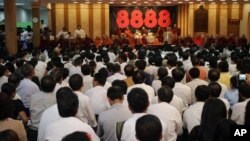BANGKOK — Authorities in Burma have for the first time acknowledged, and to some degree supported, the anniversary of the country’s 1988 pro-democracy uprising. The opposition National League for Democracy has welcomed the move as a sign of national reconciliation, while activists say there is still much reform needed.
In Rangoon, hundreds of activists and monks held prayers Wednesday to mark the 24th anniversary of a failed pro-democracy uprising.
Burma’s Ministers for Railways and Industry donated about $230 to a monastery hosting the event. They also gave over $1,000 to the group that led the movement, known as the 88 Generation.
Nyan Win, a spokesman for Burma’s opposition National League for Democracy, said the gesture was a good sign.
"We are welcome this participation and acknowledgement of the 88 Generation movement. It's a sign of national reconciliation, I think," he said.
On August 8, 1988 students in Rangoon began demonstrations against the military government in favor of reforms.
Hundreds of thousands protested across the country until they were violently put down by the military. Thousands are believed to have been killed and countless more thrown in prison, though the government only concedes a few hundred deaths.
In Bangkok, a group of demonstrators gathered in front of Burma’s embassy to honor those who died. Debbie Stothard, the coordinator for the Alternative ASEAN Network on Burma, says support for the anniversary is a giant leap from how authorities usually react. But she also notes nobody was ever held responsible for the deaths.
"I think it's not going to be a sea change unless the president himself, and the military themselves, admit that this unfortunate incident happened in their history and make some promises to make amends for what has happened in 1988," she said.
A 2010 election brought President Thein Sein to power and he surprised critics with a series of political reforms, including the release of hundreds of political prisoners.
In perhaps one of the most dramatic changes, former political prisoner and NLD leader Aung San Suu Kyi was elected to parliament.
Eighty-eight Generation member Ko Hla Htay acknowledged moves toward democracy in the country but also remaining challenges.
He says things are starting to change in Burma but he thinks this is just a beginning phase because there are discussions at parliament. However, he says, the people are not seeing any benefits so far.
The 88 Generation is calling for the release of all remaining political prisoners and for activists in exile to be allowed to return.
In Rangoon, hundreds of activists and monks held prayers Wednesday to mark the 24th anniversary of a failed pro-democracy uprising.
Burma’s Ministers for Railways and Industry donated about $230 to a monastery hosting the event. They also gave over $1,000 to the group that led the movement, known as the 88 Generation.
Nyan Win, a spokesman for Burma’s opposition National League for Democracy, said the gesture was a good sign.
"We are welcome this participation and acknowledgement of the 88 Generation movement. It's a sign of national reconciliation, I think," he said.
On August 8, 1988 students in Rangoon began demonstrations against the military government in favor of reforms.
Hundreds of thousands protested across the country until they were violently put down by the military. Thousands are believed to have been killed and countless more thrown in prison, though the government only concedes a few hundred deaths.
In Bangkok, a group of demonstrators gathered in front of Burma’s embassy to honor those who died. Debbie Stothard, the coordinator for the Alternative ASEAN Network on Burma, says support for the anniversary is a giant leap from how authorities usually react. But she also notes nobody was ever held responsible for the deaths.
"I think it's not going to be a sea change unless the president himself, and the military themselves, admit that this unfortunate incident happened in their history and make some promises to make amends for what has happened in 1988," she said.
A 2010 election brought President Thein Sein to power and he surprised critics with a series of political reforms, including the release of hundreds of political prisoners.
In perhaps one of the most dramatic changes, former political prisoner and NLD leader Aung San Suu Kyi was elected to parliament.
Eighty-eight Generation member Ko Hla Htay acknowledged moves toward democracy in the country but also remaining challenges.
He says things are starting to change in Burma but he thinks this is just a beginning phase because there are discussions at parliament. However, he says, the people are not seeing any benefits so far.
The 88 Generation is calling for the release of all remaining political prisoners and for activists in exile to be allowed to return.






